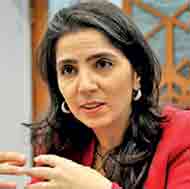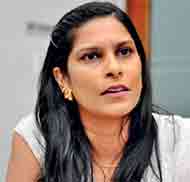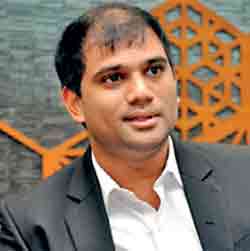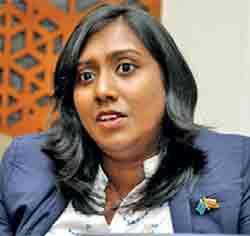Tuesday Feb 24, 2026
Tuesday Feb 24, 2026
Tuesday, 7 October 2025 02:28 - - {{hitsCtrl.values.hits}}
 |
 |
 |
 |
| ADB Senior Country Economist Lilia Aleksanyan | ADB Principal Economics Officer Lakshini Fernando | ADB Senior Economics Assistant Dinuk de Silva | ADB Associate Economics Analyst Nirukthi Kariyawasam |
By Nisthar Cassim
Economists at the Asian Development Bank (ADB) have welcomed Sri Lanka’s strong and resilient recovery so far this year amidst persistent global uncertainty.
They said that domestic demand supported growth, thus far completing eight quarters of upturn in the economy. It was pointed out that the economic recovery is projected to continue on a strong footing, but growth is expected to slow next year due to global headwinds.
ADB Senior Country Economist Lilia Aleksanyan in an interview with the Daily FT said economic momentum is supported by recovering consumption, strong remittances, and rising private credit.
On the other hand, US tariffs have settled at historically high levels and trade uncertainty remains elevated for Sri Lanka.
Aleksanyan said new US tariffs on Sri Lankan exports (mainly garments and rubber) will have a limited impact in 2025, but are expected to weigh more heavily on growth and jobs in 2026.
Risks to the outlook include stronger-than-expected effects from US tariffs, global economic uncertainty, energy price volatility, and domestic weather-related disruptions.
The ADB in its September release of Asian Development Outlook (ADO) retained its forecast for 2025 at 3.9%, whilst marginally reducing it to 3.3% for 2026 from 3.4% estimated previously. The Sri Lankan economy gained by 5% in 2024 after two years of negative growth.
The September ADO Update was based on Sri Lanka’s performance up to the first quarter. Mid-last month, the Department of Census and Statistics said the economy in Q2 grew by 4.9% as against 4.8% in the previous quarter.
Aleksanyan noted that the economy in Q2 significantly outperformed earlier forecasts. “We were very positively surprised by the strong Q2 growth. What is particularly important to note is that this recovery is now broad-based, with main sectors industry, agriculture, and services showing resilience,” she said.
Pursuing structural reforms to make the economy more efficient was also stressed.
The ADB also expects the Central Bank of Sri Lanka’s (CBSL) monetary policy stance will also help inflation to gradually improve.
ADB Senior Economics Assistant Dinuk de Silva said Sri Lanka’s inflation projection for 2025 has been revised down significantly due to longer-than-expected deflation, whilst the forecast for 2026 is maintained at 4.5%, anticipating a gradual rise as deflation pressures fade.
In terms of medium-term challenges, ADB Principal Economics Officer Lakshini Fernando was of the view that attracting high investments especially will be key, along with greater diversification of exports, for which the National Export Strategy will be a great fillip.
She also said policies are required to bring in non-debt Foreign Direct Investment (FDI), whilst the Government needs to persist with the restructuring of State-Owned Enterprises (SOEs). In that context, she welcomed upcoming new legislations, such as the SOE law and the Public Private Partnership law.
“It is important to create the environment for higher capital to flow into the country, because there will be opportunity due to global capital volatility,” Fernando emphasised.
The ADB is also satisfied with the progress with regard to fiscal management, but was of the view that the revenue momentum must be sustainable and critical capital expenditure must be expedited.
de Silva also said Sri Lanka needs to further strengthen external buffers with higher inflows from exports, tourism, and remittances so as to be ready when debt repayment kicks in from 2028.
ADB Associate Economics Analyst Nirukthi Kariyawasam said whilst macro-economic fundamentals have improved considerably, Sri Lanka needs to make social spending and support to the poor and vulnerable more effective against future shocks, along with a proper graduation program. Climate risks and disaster resilience are also issues that need continuous focus, she added.
The ADB team of economists is also looking forward to the Budget 2026 to be presented next month by President and Finance Minister Anura Kumara Disanayake for greater clarity and long-term policies, especially those aimed at attracting higher investments and strengthening of institutions.